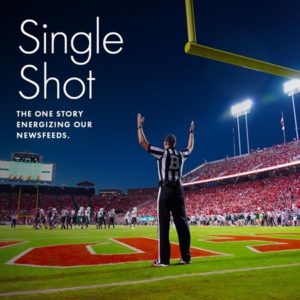Best Lawyers Interviews Frank Darras
Frank Darras was interviewed for Best Lawyers’ “All Rise” newsletter discussing the newest round of rules and regulations for compensation in college sports. Frank’s in-depth knowledge on the name/image/likeness (NIL) topic has been sought after by reporters nationwide as collegiate sports continues to be redefined by a bevy of new rules and regulations.
A New Round of Rules and Regulations for Compensation in College Sports
By Justin Smulison

A new playbook is being written for college athletics, specifically for matters occurring off the field.
The NCAA’s longstanding rules prohibiting college athletes from earning from their name, image and likeness (NIL) was put on the disabled list after a June 2021 United States Supreme Court ruling. In American Athletic Conference et al. v. Alston et al., the Court unanimously sided with former college players in a dispute with the NCAA about compensation. Furthermore, the Court said the NCAA cannot limit educational benefits to student-athletes and also rejected their argument that it is protected from the nation’s antitrust laws.
Days later, the NCAA Board of Governors adopted a uniform interim policy suspending its NIL rules for all incoming and current student-athletes in all sports. This unprecedented move opened the doors for players to potentially earn compensation from use of their NIL and to engage with companies and agents that manage NIL activities.
States of Play
Players’ rights are now governed by the state in which they play. To date, at least 22 states have NIL laws in effect and seven more have enacted laws that will go into effect between 2022 and 2025. Though the Jerry Maguires of the world are likely jumping for joy, many stakeholders are hoping for some fair, broader direction from the federal government to define and protect players’ rights.
“Aside from the state-by-state nuances of the NIL, in those states without NIL where the colleges have written their own guidelines, a federal NIL framework would eliminate rival states passing lenient laws to their neighbors’ detriment,” said Frank N. Darras, the founding partner of DarrasLaw in California. Darras litigates, consults and advises players, teams and families on drop-in slot, drop in draft protection and permanent career-ending disability insurance. “A federal framework would snuff out the checkerboard mix-and-match state laws and college-written guidelines with a uniform code, bill or act that should also level the recruiting playing field.”
There are at least seven federal bills proposed by various members of Congress that aim to provide such a framework to address issues such as taxation, players’ health and safety and the extent of NIL rights.
Darras said the “Student Athlete Level Playing Field Act” (LPFA), which was introduced in April by Rep. Anthony Gonzalez (R-OH) and Rep. Emanuel Cleaver (D-MO) is “the middle ground among the many proposed bills.” He noted that the LPFA contains “no NIL disclosure requirement of athlete contracts and no sin categories like tobacco, gambling or alcohol while benefiting from an NIL deal.” Harkening back to the Supreme Court’s decision in Alston, Darras added that the LPFA “also trims the antitrust exemption found in other proposed bills.”
Student Employment
As the bills make the rounds in Congress, college players have a cheerleader in Washington, D.C. who has helped define their employment status.
On Sept. 29, 2021, National Labor Relations Board General Counsel Jennifer Abruzzo issued a memorandum providing updated guidance regarding her position that certain “Players at Academic Institutions” (an alternate title to “student athletes”), are employees under the National Labor Relations Act (NLRA) and are afforded all statutory protections.
“Players at Academic Institutions perform services … in return for compensation and subject to their control,” Abruzzo stated in the memo. “Thus, the broad language of Section 2(3) of the Act, the policies underlying the NLRA, Board law and the common law fully support the conclusion that certain Players at Academic Institutions are statutory employees, who have the right to act collectively to improve their terms and conditions of employment.”


